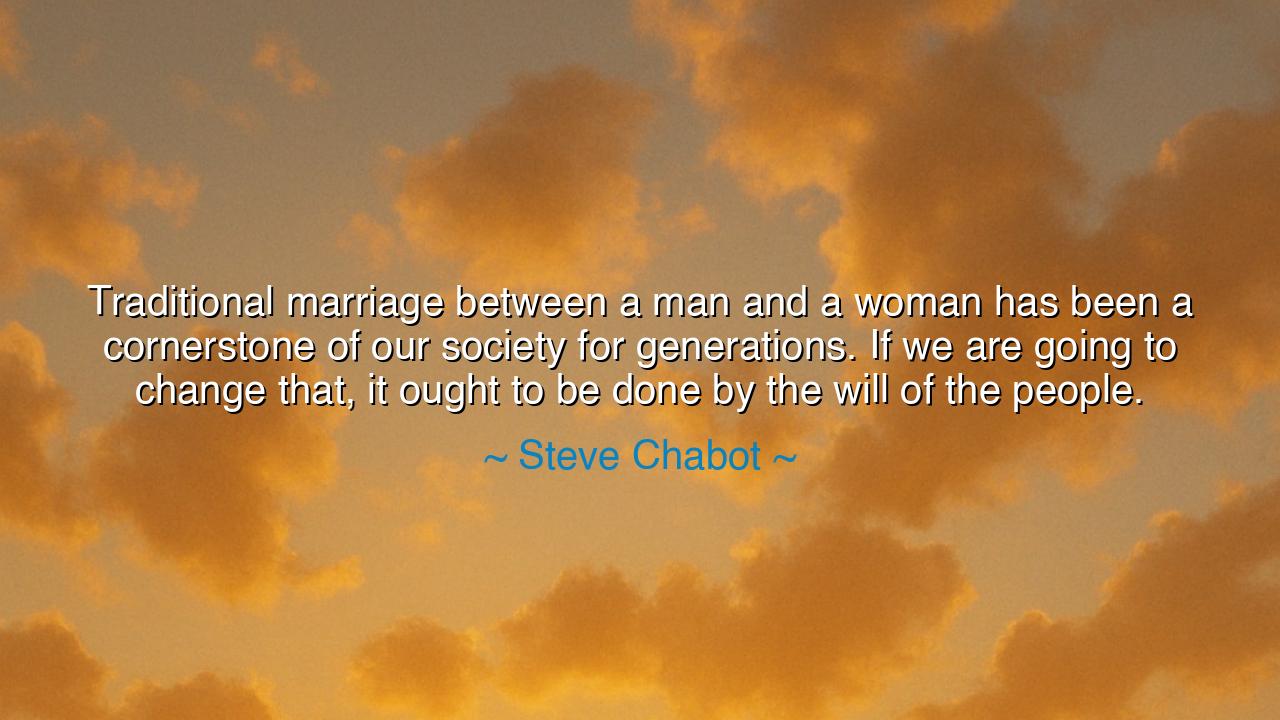
Traditional marriage between a man and a woman has been a
Traditional marriage between a man and a woman has been a cornerstone of our society for generations. If we are going to change that, it ought to be done by the will of the people.






Hear now the words of Steve Chabot, spoken with the weight of tradition and the gravity of governance: “Traditional marriage between a man and a woman has been a cornerstone of our society for generations. If we are going to change that, it ought to be done by the will of the people.” In this declaration lies not only a political statement, but a reflection of an ancient tension — the struggle between heritage and transformation, between what is long held and what is newly conceived. His words arise from a time of great debate in the modern age, when nations wrestled with the definition of marriage, not merely as a legal bond, but as a symbol of moral and cultural order.
Since the dawn of civilization, marriage has stood as more than a personal union; it has been the foundation upon which communities were built. In the eyes of the ancients, it was the covenant that bound families, preserved bloodlines, and transmitted values from one generation to the next. To alter such an institution was seen as to alter the very pillars of society. Thus, when Chabot spoke, he did so from within that long lineage of thought — one that views the family as sacred and its structure as essential to the survival of civilization itself. His warning is not merely about law, but about the slow erosion of shared meanings, the careful architecture of custom that has shaped the moral fabric of nations.
And yet, even as he invoked the cornerstone of tradition, his second sentence reveals another principle equally ancient — the idea of consent, of the will of the people. For in democratic societies, no law, however sacred its origin, stands forever untouched. The ancients understood that a city, to endure, must both remember and renew. The will of the people is the lifeblood of democracy, the voice through which the governed decide how to carry forward the wisdom of the past into the promise of the future. Chabot’s words, then, are not a refusal of change, but a call to ensure that such change, if it comes, arises from deliberation, not from decree; from dialogue, not from division.
In this way, his statement belongs to a long continuum of human history. Consider Solon of Athens, the great lawgiver, who reformed his city’s laws not by abolishing tradition, but by reshaping it with the consent of the citizens. He knew that sudden and imposed transformation breeds chaos, but change born from public will can endure. Likewise, in every era, societies have faced questions that tested their moral boundaries — questions of freedom, of equality, of who is permitted to belong. These moments are never resolved by force alone; they are resolved through the collective conscience of the people, awakening slowly, painfully, but decisively.
Chabot’s invocation of the will of the people reminds us that democracy is not a mere mechanism of voting — it is the sacred act of shared moral reflection. To allow the people to decide is to honor their capacity for reason and compassion. Yet it also carries a challenge: for the people themselves must be wise, must rise above anger and prejudice, must debate not with hatred but with humility. For the ancient philosophers taught that when democracy forgets virtue, freedom becomes anarchy, and when the people abandon justice, even their will becomes tyranny.
The debate over marriage — and indeed, over any social institution — must therefore be approached not with fear, but with reverence. Tradition is not a relic to be smashed, nor a chain to be worn forever; it is a bridge, connecting the wisdom of ancestors to the hopes of their descendants. Some will guard that bridge, fearing collapse; others will rebuild it, seeking inclusion. Both roles are needed, for progress without remembrance is rootless, and preservation without compassion is lifeless. The tension between the two is the engine of civilization itself.
Let this, then, be the teaching drawn from Steve Chabot’s words: when the time comes to question the foundations of society, do so with courage, but also with care. Let change come from understanding, not reaction; let tradition yield not to force, but to the honest persuasion of the human heart. The ancients would tell us that the strength of a people lies not in how loudly they argue, but in how deeply they listen.
So, children of the future, learn this: whether you seek to preserve or to reform, remember that both impulses spring from love — love of what is good, love of what might yet be better. To move forward without breaking what is sacred, to honor what is ancient while embracing what is new — this is the true art of democracy, and the everlasting labor of humankind.






AAdministratorAdministrator
Welcome, honored guests. Please leave a comment, we will respond soon